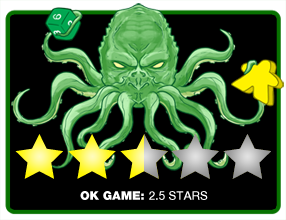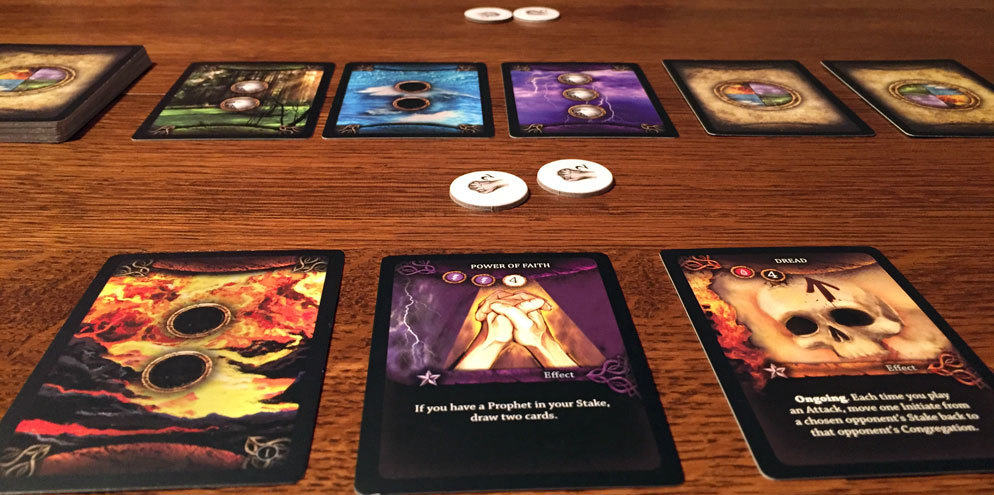 The theme of Theomachy is a pretty interesting one. Somewhere, the gods are sitting around at a party and decided to gamble. Being gods, they have no need for money. Instead, they decide to gamble with the souls of their followers. That’s right, the fate of their congregation is heading into a betting pool as the gods drink and gamble to decide who reigns supreme. Crazy, right? …and a bit scary when you think about it.
The theme of Theomachy is a pretty interesting one. Somewhere, the gods are sitting around at a party and decided to gamble. Being gods, they have no need for money. Instead, they decide to gamble with the souls of their followers. That’s right, the fate of their congregation is heading into a betting pool as the gods drink and gamble to decide who reigns supreme. Crazy, right? …and a bit scary when you think about it.
Theme aside, Theomachy takes a few familiar game concepts and tosses them into a blender. Theomachy brings its players a little bit of Magic: The Gathering, some deck building and a dash of Texas Hold’em. Does this mashup of successful genres produce an interesting game? Let’s find out.
Theomachy is a betting and dueling game for 2-4 players that takes about 45 minutes to play. Theomachy plays best with 3-4 players.
Game Overview:
In Theomachy, players take on the role of an ancient god, gambling the souls of their faithful. Each round, players will be betting their followers, casting spells, possibly trying to bluff their opponent, and eventually, fighting with each other. Fail to win the match and you’ll lose all the followers you gambled. Win, and you’ll not only keep your stake, but earn a few more for your congregation. However, once you’ve lost all your faithful, it’s game over for you.
Game Components:

We reviewed Petersen Games’ first offering to the tabletop world in the form of Cthulhu Wars and found it to be nothing short of amazing when it comes to production quality. So I had high hopes for their second offering.
For the most part, I wasn’t let down. The art in the game is, once again, stellar. Petersen Games knows how to hire artists and I loved the art in this game, especially on the god cards. They even have a nice bit of foil overlay to them that gives the cards a great shine.
Move on, the betting tokens are just ok. The original Kickstarter offered up poker chips which, after seeing at a convention, I’d highly recommend picking up if you are a fan of Theomachy. They are way more fun to use than the included cardboard tokens.
Interestingly, Theomachy comes in two sets: The Ancients and The Warrior Gods. The main difference is the pantheon included. However, if you buy both sets, you can expand your game up to 8 players.
The only other thing I’d like to see done better is the rule book. It wasn’t the most intuitive to learn the game from and could have used a bit more organization. But it’s not the worst I’ve seen, and I was still able to learn both the basic and advanced game without too much trouble.
How To Play:
There are actually three ways to play Theomachy: basic, advanced, and epic. We are going to talk about the basic game here to give you an overview of how the game is played, but will touch on the advanced game, which is miles better than the basic game. The basic version should really only be played for your very first game as you try to wrap your head around the concepts of the game.

Once all the cards are shuffled and each player has their congregation tokens, it’s time to begin. Each player will begin the game with a preset starter deck in the base game. In the advanced game, players will draft their starter decks (ala 7 Wonders or Sushi Go! style of drafting).
Basic games of Theomachy last for a number of hands (rounds) until only one player has worshipers left. Each hand takes place in the followed phases:
Start Phase: Each player draws a hand of 5 cards from their deck. 5 cards are then dealt from the constellation deck to the center of the table, with 3 face up and 2 face down. Each player then ante’s up.
Betting Phase: During the betting phase, players can play cards from their hand and bet in a standard poker style (raise, call, pass). To play a card, you must be able to pay for it. Cards require a specific number of elements and/or orbs to be showing on the constellation cards in the center of the table. Action cards are resolved immediately, while power cards will give you personal elements/orbs to aid in future card play.
There are 3 rounds of betting, with the second and third round starting with revealing the next facedown constellation card. Poker players will recognize this as the “river”, “flop” and “turn”.

Battle Phase: Any players who haven’t folded during the betting phase will now fight. Players can play fight cards from their hand to increase their power. A player’s power equals the value of all their worshipers they bet (their stake), plus any fight cards they play. The player with the most power wins the hand. Losing players must discard their stake.
Prayer Phase: Each player, beginning with the player that won the hand, must select a card from the prayer track and add it to their deck (discard pile).
That’s it for the basic game. The advanced game will give each player a pantheon and a god to control during the game. Each god will have a special power, and a way that they can earn miracle tokens. Miracle tokens can be spent to buy cards from a player’s myth deck. These will give players powerful heroes or special abilities to use during future hands.
In the basic and advanced game, the game ends when only one player has worshipers remaining. In the epic game, players will play until one player has reached 10 victory points.

Game Experience:
One good thing that Theomachy does is that it gives players a few different ways to play the game. Between the basic, advanced and epic versions, I’d say that epic is probably the best… although it’s also the most complex.
Basic was definitely my least favorite way to play the game, which is too bad, since players really need to start with that one. Theomachy definitely has a bit of a learning curve, and it can be easy to feel overwhelmed at the start, even with the basic rules. However, once you get a few games under your belt, you can really start to experience all that Theomachy has to offer.

Whether or not you will like Theomachy probably comes down to one question. Do you like poker style betting in games? If the answers is no, then you are most likely not going to enjoy Theomachy. The betting/gambling aspect is a core part of this game and unless you are a big fan of that, Theomachy will start to feel really random.
Many times you will draw great cards, yet the constellations won’t have the right elements/orbs you need to play your cards. This will leave you with a hand of essentially worthless cards. So what’s player to do? If you are like me, who generally sucks at gambling games, you fold and continue to lose.
This is where the enjoyment of the game can diverge. If you are a big gambling fan, especially Texas Hold’em style of gaming, then I think you might really like Theomachy. Even though I rarely play poker, I know a big aspect of the game is bluffing and reading your opponents. Both of those skills will be necessary if you hope to win in Theomachy. Personally, I’ve never been very good at bluffing in poker, maybe I’m just too cautious of a player.
So if you are not good at/don’t enjoy bluffing in games, then you will be at the mercy of lady luck in Theomacy. From the cards you draw in your hand, to what the constellation provides you, to even some of the ways gods acquire miracle tokens, many aspects of the game will be outside of your control.

With the advanced game, I liked that players can draft their starting decks. However, some of the cards can definitely feel way more powerful than the others. That should be balanced by their casting costs, yet it didn’t always feel that way. There were a few cards in the game that could easily win a hand for a player, such as one that removes all initiates from your opponent’s stake. Sometimes it felt really frustrating to constantly butt heads against those powerful cards.
The player elimination aspect of the game didn’t actually bother me as much as I thought it would. While I’m rarely a fan of player elimination in games, in our plays of Theomachy it actually didn’t end up being a big barrier. Usually by the time a player was knocked out, one other player was clearly in the lead and we ended up just calling it. Now this might change if you are in a 6+ player game. But for 3-4 players, I’d suggest either going that route or playing the epic version of the game that awards victory points.
Final Thoughts:
Theomachy ended up being an interesting experiment that combined some well-loved genres into a game with some gorgeous artwork. However, as I mentioned above, I don’t think the play style is going to be for everyone. It really boils down to how much you enjoy Texas Hold’Em Poker. If you are a big fan, then Theomachy is your baby. It adds some nice new elements to that style of game and offers a great amount of replay value.
Yet if you are not a fan of poker, then you are going to want to give this one a pass. You really need to enjoy bidding, bluffing, risk and reading other players to be successful at Theomachy. Otherwise the game is going to feel too random for you. Even with the deck building, dueling and card drafting mechanics added, Theomacy is, at its heart, a betting game.
I feel like Theomachy is going to end up being a decisive game, where players will either love it or hate it without much middle ground. I really wanted to like Theomachy. It checked off a lot of boxes for me. However, as I’m just not much of a poker fan, this one probably wont be making its way to the table very often, despite the gorgeous artwork.
If you’d like to get a copy of Theomachy, you can pick it up for about $30.
Final Score: 2.5 Stars – An interesting mashup of some well-known gaming mechanics, however the randomness holds this one back for all by the most die-hard of Texas Hold’em fans.
 Hits:
Hits:
• Beautiful artwork
• Clever mashup of mechanics
• 3 ways to play to suite preferences
Misses:
• Too much randomness
• Must be a poker fan to enjoy
• Player elimination in all but the epic games






















